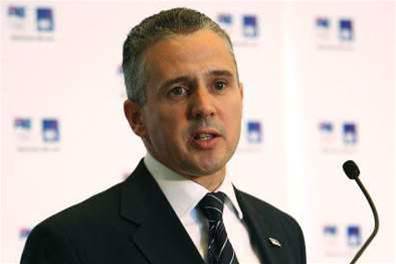Telstra chief executive Andy Penn has committed to investing more than $5 billion in the telco's mobile network over the next three years during his first major speech since taking the job.

At a CEDA event in Sydney today, Penn said Telstra would use the investment to expand its 4G footprint to 2.5 million square kilometres. Telstra typically spends around $1 billion a year on its network.
Rival Optus in May said it would up its infrastructure spend to $1.8 billion over the coming year to increase its share in the fixed-line market.
Penn today also committed to "rapidly deploying" LTE Advanced network speeds of up to 600 megabits per second and voice over LTE, but did not provide a specific timeline.
"We will increase our total capex investments to 15 percent of sales for the next two years providing more than another half a billion dollars for mobiles," Penn said.
"Ultimately all digital innovation is dependent on the quality of the underlying network. It is our networks that are the enablers of the technology we use today. "
Penn said the company was also working with partners on new technologies, such as drones and balloons, to boost coverage in remote and regional areas.
Aside from investments in networks, particularly mobile, Penn said new technologies and customer service would be a key focus of his leadership at Telstra.
He also said he "intended to champion" customer service, admitting Telstra had more work to do in this area despite the focus it received under previous chief executive David Thodey.
"When David Thodey was appointed CEO in 2009 he declared himself agent of the customer – I make the same commitment. While we have made significant progress, we clearly have more to do," Penn said.
"We still experience too many instances of failure – where we do not deliver everything we should, where we do not make it easy for our customers to be successful."
In response to a question about whether Telstra would focus its investments and growth in Australia, Asia or globally, Penn said the answer was all the above.
"Someone said you don't make proportional predictions about where your business is growing to grow," he said.
"You maximise and optimise the potential of your business to the maximum possible extent. We see opportunities globally, Asia-Pacific... as well as interesting adjacencies in Australia.
"I really think one of the wonderful things about the innovation we're seeing is it's dropping the barriers with international expansion."
Disruptive trends
Alongside the growth of mobile services, Penn identified the shift from on-premises data centre and machine learning as disruptive key trends reshaping the telco sector.
"The biggest risk I see is not responding. We have to take a measured and considered approach and have appropriate risk management processes in place... But the biggest risk is not embracing technological innovation."
Penn said Telstra would make further investments in "digital-first" businesses including startups, video advertising through Ooyala and health tech.
"Telstra is no longer simply a phone company – technology pervades everything we do. Our vision, my vision is that we now take this to the next level and become truly world class," Penn said.
"Through Telstra Ventures, we invest in start-ups because that is where many of the new ideas and innovations are coming from.
"Last week we launched ReadyCare based in a high-tech purpose built telemedicine centre right here in Sydney. For many Australians access to a doctor is a major challenge given where they live and work."
He cited partnerships with companies such as Facebook, Google and Apple as being crucial to ensuring the company isn't left behind.
Penn also acknowledged robotics as another area of rapid change, but said the company would not be investing in hardware businesses.
He did, however, cite software defined networks as an example of an area of robotics in which Telstra would consider investing.


_(22).jpg&h=140&w=231&c=1&s=0)
_(28).jpg&h=140&w=231&c=1&s=0)

_(23).jpg&h=140&w=231&c=1&s=0)



_(26).jpg&w=100&c=1&s=0)

 iTnews Executive Retreat - Security Leaders Edition
iTnews Executive Retreat - Security Leaders Edition












_(1).jpg&h=140&w=231&c=1&s=0)



